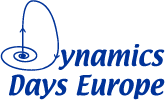|
|
MS4: Networks
All talks are in room J002 Edward Herbert Building. The schedule is available here and abstracts are available here.
Dynamics of Multilayer Networks
- Anna Zakharova Institut für Theoretische Physik, Technische Universität Berlin, Germany
Title: Coherence-incoherence patterns in multiplex networks
- Vladimir V. Makarov Yurij Gagarin State Technical University of Saratov, Russia
Title: Pattern formation in spatially-distributed multiplex networks
- Inmaculada Leyva Complex Systems Group - Universidad Rey Juan Carlos Laboratory of Biological Networks - Centre for Biomedical Technology, Madrid, Spain
Title: Relay synchronization in multiplex complex networks
- Jakub Sawicki Institut für Theoretische Physik, Technische Universität Berlin, Germany
Title: Partial relay synchronization in multiplex networks
Inference of Networks
- Michael Small School of Mathematics and Statistics, University of Western Australia and Complex Data Modelling Group, University of Western Australia
Title: Networks from multi-channel dynamics
- Marc Grau Leguia Department of Information and Communications Technologies, Universitat Pompeu Fabra, Barcelona, Spain
Title: Inferring of directed networks using rank based connectivity measures
- Marc Goodfellow Living Systems Institute, University of Exeter, UK
Title: Network models of seizures to understand epilepsy surgery
- Gloria Cecchini Institute for Complex Systems and Mathematical Biology, University of Aberdeen, UK
Title: Analytical approach to reconstruct the vertex degree distribution
Chimera States I
- Peter Ashwin Department of Mathematics, University of Exeter, UK
Title: An organising centre for chimera states in small networks
- Iryna Omelchenko Institut für Theoretische Physik, Technische Universität Berlin, Germany
Title: Optimal design of the tweezer control for chimera states in small systems
- Christian Bick Department of Mathematics, University of Exeter, UK
Title: Chaos and chaotic weak chimeras in minimal oscillator networks
- Oleh Omel 'chenko Weierstrass Institute, Berlin, Germany
Title: Quasiperiodic chimera states
Chimera States II
- Giulia Ruzzene Universitat Pompeu Fabra, Barcelona, Spain
Title: Control of chimera states with minimal coupling modifications
- Volodymyr Maistrenko Scientific Center for Medical and Biotechnical Research, Ukraine
Title: Chimera states in three dimensional networks
- Astero ProvataInstitute of Nanoscience and Nanotechnology
National Center for Scientific Research "Demokritos", Athens, Greece
Title: Chimera states in two dimensional networks with hierarchical connectivity
- Tanmoy Banerjee Chaos and Complex Systems Research Laboratory, Department of Physics, University of Burdwan, West Bengal, India
Title: Chimera patterns in ecological networks
- Irmantas Ratas Center for Physical Sciences and Technology, Lithuania
Title: Chimera-like states in two interacting populations of heterogeneous quadratic integrate-and-fire neurons
Chimera States III
- Erik A. Martens Department of Applied Mathematics and Computer Science, Technical University of Denmark
Title: From Chimera States to Collective Chaos in Kuramoto Oscillator Networks
- Bogdan Penkovsky FEMTO-ST Institute/Optics Department, CNRS & Univ. Bourgogne Franche-Comté CNRS, France
Title: Chimera States in Nonlinear Systems with Multiple Delayed Feedbacks
- Ralph Andrzejak Universitat Pompeu Fabra, Barcelona, Spain
Title: Synchronization in multilayer networks showing chimera states
- Nadezhda Semenova Saratov State University, Russia
Title: Coherence-resonance chimeras. Impact of time-delayed feedback
|
|
|









